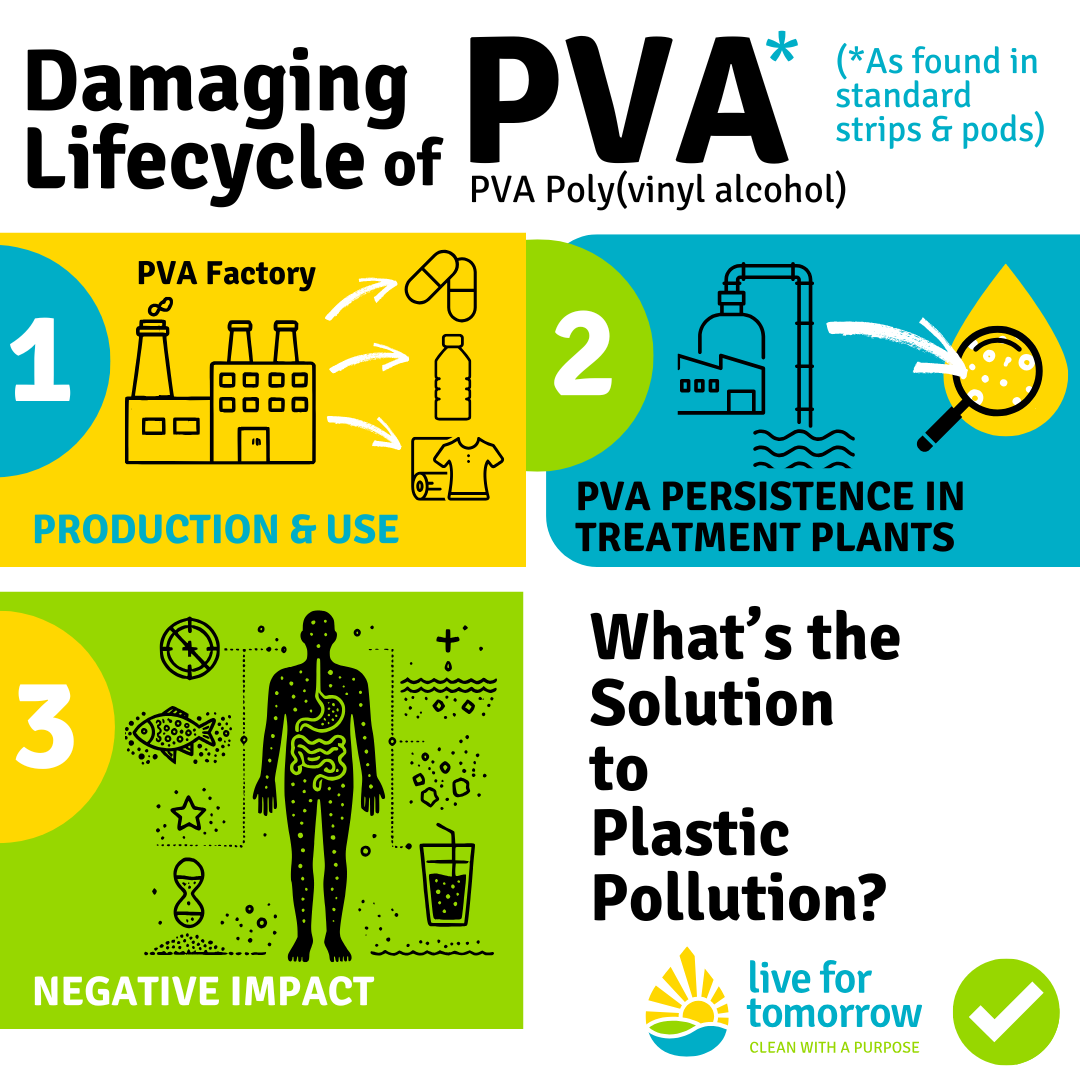Introduction
Poly(vinyl alcohol) (PVA) is a synthetic polymer celebrated for its water solubility and versatility. From laundry pods to pharmaceuticals, PVA plays a crucial role in modern industries. However, concerns about its incomplete biodegradability and environmental impact are driving conversations about more sustainable alternatives. This article examines PVA’s lifecycle, challenges in wastewater treatment, and why eco-friendly options like Live for Tomorrow (LFT) products may provide a better path forward.
Applications of PVA: Useful but Problematic
Invented in 1924, PVA has become a key material in textiles, packaging, and other industries due to its strength and water-soluble properties. It’s widely used in coatings, adhesives, and films. However, while its functionality is undeniable, its environmental sustainability is increasingly questioned. Its solubility in water often leads to misconceptions that it fully degrades (1).
The Biodegradability Problem: Misconceptions About Wastewater Treatment
PVA is marketed as biodegradable, but standard wastewater treatment plants are unable to completely break it down. While specific conditions in advanced treatment processes can facilitate biodegradation, typical facilities often achieve only partial degradation, leaving microplastics and other residual compounds in treated water (2). These persistent particles can end up in rivers, lakes, and oceans, creating long-term environmental risks.
From Treatment Plants to Oceans: The Ripple Effect
The incomplete degradation of PVA in wastewater treatment plants results in residual particles entering aquatic ecosystems. These microplastics can accumulate in marine organisms, affecting biodiversity and threatening food safety for humans. Fish and other aquatic creatures ingest these particles, which can move up the food chain and potentially harm human health (2, 3).
Health and Environmental Impacts: Microplastics in the Food Chain
PVA-derived microplastics pose risks for aquatic and terrestrial ecosystems. When humans consume seafood containing these microplastics, they may be exposed to pollutants carried by the particles. Although the long-term effects of such exposure remain under study, potential risks include endocrine disruption, inflammation, and cellular damage (3).
Live for Tomorrow: A Truly Sustainable Alternative
In the face of these challenges, products like Live for Tomorrow (LFT) provide a sustainable alternative to PVA-based solutions. LFT cleaning products use biodegradable, plant-based ingredients designed to minimize environmental impact. Unlike PVA, LFT’s formulations break down completely, leaving no harmful residues behind.
Key Advantages of LFT Products:
- Readily biodegradable, ensuring complete breakdown in natural environments.
- Reduced use of plastics in packaging.
- Transparency in ingredient sourcing and environmental responsibility.
By switching to products like LFT, consumers can actively reduce their contribution to the growing microplastic crisis.
Conclusion
While PVA has enabled many industrial advances, its environmental costs cannot be ignored. Its incomplete biodegradation in wastewater systems contributes to the growing problem of microplastics in ecosystems and human food chains. Products like LFT cleaning solutions offer an opportunity for consumers to choose truly sustainable alternatives, fostering a future where innovation and environmental stewardship coexist.
Updated Sources:
- Chemical Book: Polyvinyl Alcohol Properties, Production Process, and Uses
- Royal Society of Chemistry: Poly(vinyl alcohol) Biodegradation
- Springer: Poly(vinyl alcohol) as Sustainable and Eco-Friendly Packaging



